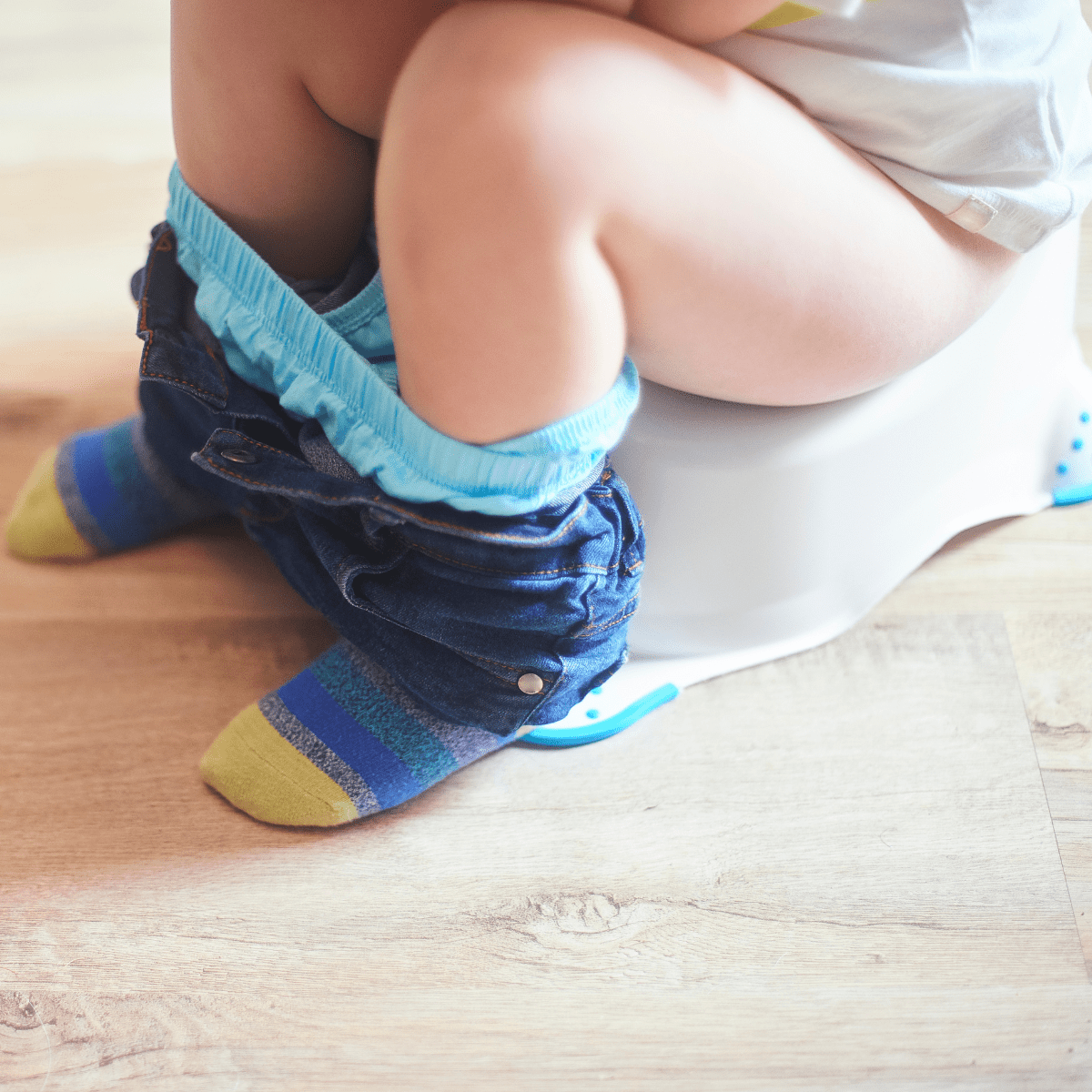How Probiotics Help With Toddler Constipation
Nov 09, 2022, Updated Jun 10, 2025
This post contains affiliate links. Please see our disclosure policy.
You know when your toddler’s digestive system gets backed up (when they’re constipated)? Or goes into overdrive (when they have diarrhea)? A healthy boost of probiotics—along with giving them more water and fiber, which also support gut health—can help promote regularity and decrease any discomfort they feel!
But are all probiotics safe? Created equal? And are they all kid-friendly? By reading this post, you’ll get these answers and more—plus a list of my go-to probiotics for treating different conditions!
If your toddler is often constipated, just like probiotics, this post will be a big help.
Disclaimer: this post is for informational purposes only. For medical advice for your child, please seek help from their healthcare provider. This is not a substitute for obtaining medical care.
Table of Contents
- Let’s Talk Toddler Constipation
- What Probiotics Are & How They Work
- Probiotics For Toddler Constipation: Do They Work?
- Pair Probiotics With Diet-Related Changes For Better Results
- How Long Does It Take To See Results?
- Does My Toddler Need To Keep Taking Probiotics To Keep Seeing Benefits?
- Probiotics for Specific Concerns & Issues
Let’s Talk Toddler Constipation
Constipation in toddlers can cause discomfort, abdominal pain, and unusually hard stool that’s difficult for them to pass. There are a few reasons why it can happen:
- Diet (common in picky eaters who might not get everything they need in their diet)
- Lack of water
- Low fiber intake
Constipation can also be a sign of an underlying medical condition. So if your child has chronic constipation, check with your pediatrician to rule out any medical issues. While diet can trigger constipation, there can be causes that are completely unrelated to what they eat.
There are things you can do to troubleshoot the problem at home. But first, get the all-clear from your doctor. If together, you’re pretty confident your child’s constipation is just occasional and more likely related to their diet, there are some standard recommendations you’ll hear.
Your doctor will probably suggest simple changes like upping their water intake and increasing the amount of fiber they eat. And they might suggest a probiotic, too, to keep their bowels moving and regular. This is good advice because probiotics have been shown to help with constipation (more on that below!), but don’t let them tell you that all probiotics are the same. I hear from families often that their doctors have said this, and it’s usually just because they don’t have the most up-to-date research on which strains are most helpful for constipated toddlers.
If you want to get specific about the best probiotic for your kiddo (and trust me, you do!), keep reading this post! And consider working with a registered dietitian with specific knowledge on this topic.

What Probiotics Are & How They Work
Probiotics are what I like to call the ‘good bacteria’ that live in our gastrointestinal (GI) tract. They help us break down the food we eat so we can get all the nutrients possible out of it. And, they keep things moving through our digestive tracts to help us get rid of waste we don’t need.
(I’m keeping this description super short and sweet on purpose, but if you want to dig deeper and learn more, read my ultimate guide to probiotics and how they work!)
We often think of probiotics in their supplement forms (usually drops or tablets), but they exist naturally in certain foods, too. Fermented foods like yogurt, some sauerkraut, kefir, miso, some types of pickles, tempeh, and kombucha often have probiotics in them. So if you want your toddler to consume more probiotics in general, you don’t need to go straight to a supplement. Probiotic-rich foods can be a good place to start.
Related: Best Probiotic Foods for Kids
That said, it’s important to note that there isn’t a perfect dietary solution to GI issues like constipation. Along with introducing probiotic-rich foods, ensuring your child gets enough fiber and water can help a lot. But parents often find themselves turning to probiotic supplements for that extra boost of help, too! The research supports use of probiotic supplements to treat constipation, whereas probiotic-containing foods don’t have the same proof to combat constipation.

Are Probiotic Supplements Safe for Kids?
Yes, probiotic supplements are generally considered safe for healthy children. They don’t usually have any negative side effects either—just a few reported cases of occasional gas and bloating. So overall, they’re a pretty safe bet.
I never want you to feel like supplements of any kind are a MUST because, as I mentioned, there are dietary ways to support your child’s gut health. But probiotic supplements can be really helpful in dealing with more acute gut symptoms your toddler may be experiencing.
When introducing probiotics, I recommend working with your pediatrician—and maybe even a registered dietitian—to figure out exactly which ones are best for your child and in what dosage. Then, pick a brand you feel you can trust because probiotics aren’t regulated by the FDA.
(I’ll give you some suggestions of brands I trust in this post, but know that it’s not a replacement for medical advice, and I’d always want you to defer to what your pediatrician says since they know your child and I don’t. But absolutely ask them questions to figure out whether they are knowledgeable on this specific topic or not!)
Probiotics For Toddler Constipation: Do They Work?
Multiple studies have shown that yes, probiotics do seem to have a positive effect on certain conditions like constipation, gastroenteritis, and diarrhea! There have even been studies showing that probiotics have positive effects outside of the lower GI tract too, like helping to ward off upper respiratory infections and runny noses. (Just note that none of these effects have been proven in large clinical studies just yet.)
The effectiveness of your probiotics can vary a lot though, based on the strain you choose. There are over 500 strains of probiotics and each one does something different in the body, so it’s important to pick one that can help your child with their gut issues.
There isn’t one gold standard probiotic strain for the treatment of constipation, but strains that may help relieve it in children are:
- L. reuteri*
- L. rhamnosus
- L. acidophilus
- B. lactis
- B. breve
Look for a probiotic that contains one or a combination of these strains.
Pair Probiotics With Diet-Related Changes For Better Results
While the studies suggesting that probiotics can help treat constipation and diarrhea in toddlers are promising, that doesn’t make them a surefire solution. If your child is constipated, probiotics won’t necessarily be the magic wand that makes get things movin’ again. But, when paired with lots of water and fiber in their diet, they can go a long way in promoting good digestion, gut motility, and bowel regularity.
Here are a few resources to help you make regularity-promoting changes to your toddler’s diet:
- Blog Post: High-Fiber Foods for Toddlers
- Podcast Episode: Constipation: Foods That Help Kids Poop

How Long Does It Take To See Results?
There isn’t a one size fits all answer for how fast probiotics ‘work’ in the gut or how long your child will need to take them. But know that in general, can take up to 2 to 3 weeks of consistent use for your child to experience all the benefits of probiotics. (There is still a chance you’ll see an improvement in their symptoms sooner, though! Even within a few days.)

Does My Toddler Need To Keep Taking Probiotics To Keep Seeing Benefits?
Probiotics aren’t known to ‘colonize’ in the gut (meaning stay there forever), so yes, the benefits your toddler experiences will be strongest while they’re taking them regularly. That’s why, if your toddler deals with constipation fairly often, a daily probiotic supplement might be recommended.
Probiotics for Specific Concerns & Issues
As I mentioned above, the effectiveness of your probiotics depends on the strain you choose AND the appropriate dosage. There are over 500 probiotic species, and they vary in both their effectiveness and the symptoms they can help treat. Some are better for constipation, some for diarrhea, some for upper respiratory infections, and some can even help with certain types of eczema. So it’s important to pick one that can help with the specific gut issues your child is facing!
Many probiotic supplements combine 5 or 6 different strains. And while it might sound like more is better, having a greater number of strains (like 10+) in a supplement doesn’t necessarily make a probiotic ‘stronger’ or better. Sometimes, it can actually ‘weaken’ the supplement because the combination might force some strains to compete for survival against each other. (Who knew there was so much drama in the supplement aisle!)
If you’re looking to target one specific symptom, like constipation, it may be best to choose an isolated strain—one that has a research-backed correlation with that symptom—or to choose a supplement with a small number of strains targeted for that condition.
I don’t want feeding your kid to feel like you’re taking an organic chemistry class though! 😅 So to save you a few hours of researching and label reading, I put together a list of probiotics I like for each symptom mentioned in this post.
Some are available on Amazon, so I included links to those! (As an Amazon Associate, I earn from qualifying purchases at no extra cost to you.)
Probiotics for Treating Constipation
- Garden of Life Kids Chewable Probiotic
- Gerber Good Start Grow Kids Probiotic Tablets
- BioGaia Protectis Tablets
- BioGaia Protectis Drops
- Chewable Pedia-Lax Probiotic Yums
Probiotics for Preventing Antibiotic-Associated Diarrhea
- BioGaia Protectis Tablets
- BioGaia Protectis Drops
- FlorastorKids Capsules
- FlorastorKids (Unflavored Packets)
- Culturelle Kids Daily Chewable Probiotic
- Culturelle Kids Daily Probiotic (Flavorless Packet)
- Chewable Pedia-Lax Probiotic Yums
Probiotics for Diarrhea and Stomach Flus
- Culturelle Kids Daily Chewable Probiotic
- Culturelle Kids Daily Probiotic (Flavorless Packet)
- BioGaia Protectis Tablets
- BioGaia Protectis Drops
- FlorastorKids Capsules
- FlorastorKids Sachets
- Gerber Good Start Grow Kids Chewable Probiotic
- Chewable Pedia-Lax Probiotic Yums
- Visbiome Capsules
- Visbiome Sachets
- Visbiome Extra Strength Sachets













